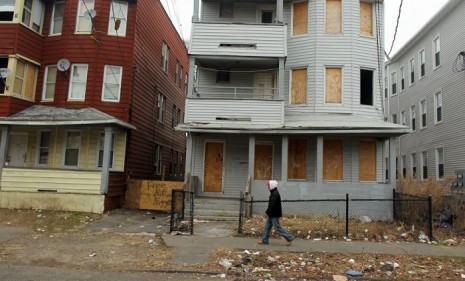Is the U.S. in for a 'lost decade'?
America's economic troubles look like Japan's before its 10-year tail-spin in the '90s, says Rick Newman in U.S. News. But our hangover won't last as long

A free daily email with the biggest news stories of the day – and the best features from TheWeek.com
You are now subscribed
Your newsletter sign-up was successful
With the economic recovery faltering, many Americans are wringing their hands, says Rick Newman at U.S. News and World Report, and wondering how long the pain will last. For answers, economists are looking to Japan. In the 1980s, the Japanese economy was "going gangbusters." The boom inflated a real-estate bubble, much like the one in the U.S. in the early 2000s. Then, like ours, it burst. "The collateral damage sent Japan's economy into a 10-year tailspin." If the U.S. follows a "Japanification scenario," it will be an "economic wasteland" in 2020, with stocks down 60 percent, and home prices off by half. But we've already avoided many of Japan's errors, so our "lost decade" will probably only last a couple more years. Here, an excerpt:
Federal Reserve Chairman Ben Bernanke intently studied Japan's lost decade while a scholar at Princeton, and chided Japan's government for responding too slowly and weakly. When the U. S. economy hit similar obstacles, Bernanke's Fed deliberately avoided many of the mistakes now attributed to Japan's central bank in the '90s. The Fed cut interest rates to stimulate the economy more quickly and deeply than the Bank of Japan did. It also took the more unusual step of buying about $1.5 trillion worth of mortgage-backed securities, pumping money into the system, and stimulating demand for other types of securities — like stocks...
Then there were the bank bailouts that began during the Bush administration. As unpopular as they were, those "capital injections" directly addressed a problem that bedeviled Japan in the '90s: "zombie" banks that were financially crippled but stayed in business, sitting on vast amounts of money that otherwise would have been loaned and invested, generating badly needed economic activity. The bailouts more or less worked: The U.S. financial system is healing, with bank lending to big companies pretty much back to normal.
The Week
Escape your echo chamber. Get the facts behind the news, plus analysis from multiple perspectives.

Sign up for The Week's Free Newsletters
From our morning news briefing to a weekly Good News Newsletter, get the best of The Week delivered directly to your inbox.
From our morning news briefing to a weekly Good News Newsletter, get the best of The Week delivered directly to your inbox.
Read the full article at U.S. News and World Report.
A free daily email with the biggest news stories of the day – and the best features from TheWeek.com
-
 Nordic combined: the Winter Olympics sport that bars women
Nordic combined: the Winter Olympics sport that bars womenIn The Spotlight Female athletes excluded from participation in demanding double-discipline events at Milano-Cortina
-
 Samurai: a ‘blockbuster’ display of Japanese heritage
Samurai: a ‘blockbuster’ display of Japanese heritageThe Week Recommends British Museum show offers a ‘scintillating journey’ through ‘a world of gore, power and artistic beauty’
-
 BMW iX3: a ‘revolution’ for the German car brand
BMW iX3: a ‘revolution’ for the German car brandThe Week Recommends The electric SUV promises a ‘great balance between ride comfort and driving fun’